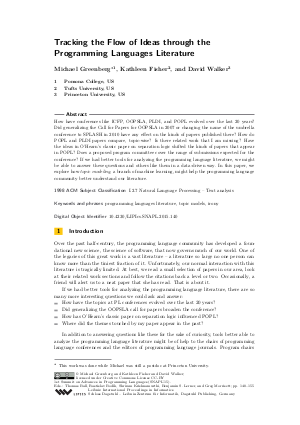Tracking the Flow of Ideas through the Programming Languages Literature
Authors Michael Greenberg, Kathleen Fisher, David Walker
-
Part of:
Volume:
1st Summit on Advances in Programming Languages (SNAPL 2015)
Part of: Series: Leibniz International Proceedings in Informatics (LIPIcs)
Part of: Conference: Summit on Advances in Programming Languages (SNAPL) - License:
 Creative Commons Attribution 3.0 Unported license
Creative Commons Attribution 3.0 Unported license
- Publication Date: 2015-04-30
File

PDF
LIPIcs.SNAPL.2015.140.pdf
- Filesize: 1.15 MB
- 16 pages
Document Identifiers
Subject Classification
Keywords
- programming languages literature
- topic models
- irony
Metrics
- Access Statistics
-
Total Accesses (updated on a weekly basis)
0Document
0Metadata
Abstract
How have conferences like ICFP, OOPSLA, PLDI, and POPL evolved over the last 20 years? Did generalizing the Call for Papers for OOPSLA in 2007 or changing the name of the umbrella conference to SPLASH in 2010 have any effect on the kinds of papers published there? How do POPL and PLDI papers compare, topic-wise? Is there related work that I am missing? Have the ideas in O'Hearn's classic paper on separation logic shifted the kinds of papers that appear in POPL? Does a proposed program committee cover the range of submissions expected for the conference? If we had better tools for analyzing the programming language literature, we might be able to answer these questions and others like them in a data-driven way. In this paper, we explore how topic modeling, a branch of machine learning, might help the programming language community better understand our literature.
Cite As Get BibTex
Michael Greenberg, Kathleen Fisher, and David Walker. Tracking the Flow of Ideas through the Programming Languages Literature. In 1st Summit on Advances in Programming Languages (SNAPL 2015). Leibniz International Proceedings in Informatics (LIPIcs), Volume 32, pp. 140-155, Schloss Dagstuhl – Leibniz-Zentrum für Informatik (2015)
https://doi.org/10.4230/LIPIcs.SNAPL.2015.140
BibTex
@InProceedings{greenberg_et_al:LIPIcs.SNAPL.2015.140,
author = {Greenberg, Michael and Fisher, Kathleen and Walker, David},
title = {{Tracking the Flow of Ideas through the Programming Languages Literature}},
booktitle = {1st Summit on Advances in Programming Languages (SNAPL 2015)},
pages = {140--155},
series = {Leibniz International Proceedings in Informatics (LIPIcs)},
ISBN = {978-3-939897-80-4},
ISSN = {1868-8969},
year = {2015},
volume = {32},
editor = {Ball, Thomas and Bodík, Rastislav and Krishnamurthi, Shriram and Lerner, Benjamin S. and Morriset, Greg},
publisher = {Schloss Dagstuhl -- Leibniz-Zentrum f{\"u}r Informatik},
address = {Dagstuhl, Germany},
URL = {https://drops.dagstuhl.de/entities/document/10.4230/LIPIcs.SNAPL.2015.140},
URN = {urn:nbn:de:0030-drops-50232},
doi = {10.4230/LIPIcs.SNAPL.2015.140},
annote = {Keywords: programming languages literature, topic models, irony}
}
Author Details
References
-
Lougie Anderson, Glen B. Alleman, Kent Beck, Joe Blotner, Ward Cunningham, Mary Poppendieck, and Rebecca Wirfs-Brock. Agile management - an oxymoron?: Who needs managers anyway? In OOPSLA, pages 275-277, 2003.

- David Blei. Topic modelling. http://www.cs.princeton.edu/~blei/topicmodeling.html, 2015.
-
David Blei and John Lafferty. Dynamic topic models. In International Conference on Machine Learning, 2006.

-
David M Blei. Probabilistic topic models. Communications of the ACM, 55(4):77-84, 2012.

- Laurent Charlin and Richard Zemel. The Toronto Paper Matching System: An automated paper-reviewer assignment system. In ICML Workshop on Peer Reviewing and Publishing Models, June 2013. See also URL: http://papermatching.cs.toronto.edu/webapp/profileBrowser/about_us/.
-
Dennis de Champeaux, Robert Balzer, Dave Bulman, Kathleen Culver-Lozo, Ivar Jacobson, and Stephen J. Mellor. The OO software development process (panel). In OOPSLA, pages 484-489, 1992.

-
Ankush Desai, Vivek Gupta, Ethan Jackson, Shaz Qadeer, Sriram Rajamani, and Damien Zufferey. P: Safe asynchronous event-driven programming. In Programming Language Design and Implementation (PLDI), 2013.

-
Marco Gaboardi, Michael Greenberg, and David Walker. Type systems for SDN controllers, 2015. PLVNET.

-
Michael Greenberg. Space-efficient manifest contracts. In Principles of Programming Languages (POPL), 2015.

-
Peter Hawkins, Alex Aiken, Kathleen Fisher, Martin Rinard, and Mooly Sagiv. Concurrent data representation synthesis. In Programming Language Design and Implementation (PLDI), 2012.

-
Greg Morrisett, David Walker, Karl Crary, and Neal Glew. From System F to Typed Assembly Language. In Principles of Programming Languages (POPL), 1998.

-
George C. Necula. Proof-carrying code. In Principles of Programming Languages (POPL), 1997.

-
Robert Nix. Editing by example. In Principles of Programming Languages (POPL), 1984.

-
Peter-Michael Osera and Steve Zdancewic. Type-and-example-directed program synthesis. In Programming Language Design and Implementation (PLDI), 2015.

-
Xiaolin Shi, Ramesh Nallapati, Jure Leskovec, Dan McFarland, and Dan Jurafsky. Who leads whom: Topical lead-lag analysis across corpora. In NIPS Workshop, 2010.

-
Virender Singh, Alicia Perdigones, and Fernando R. Mazarrón José Luis Garcia, Ignacio Cañas-Guerroro. Analyzing worldwide research in hardware architecture, 1997-2011. CACM, 58(1):76-85, 2015.

-
Asumu Takikawa, T. Stephen Strickland, Christos Dimoulas, Sam Tobin-Hochstadt, and Matthias Felleisen. Gradual typing for first-class classes. In Proceedings of the ACM International Conference on Object Oriented Programming Systems Languages and Applications, OOPSLA'12, pages 793-810, New York, NY, USA, 2012. ACM.

- TMVE: Topic model visualization engine. https://code.google.com/p/tmve/, 2015.
- Princeton University. Wordnet. http://wordnet.princeton.edu, 2010.
